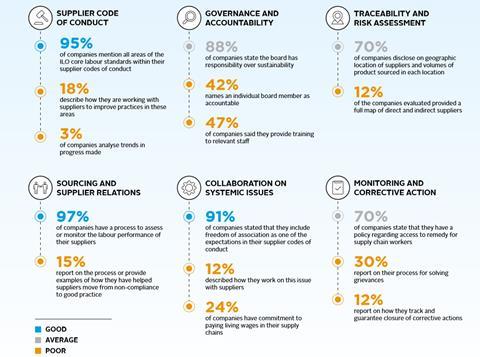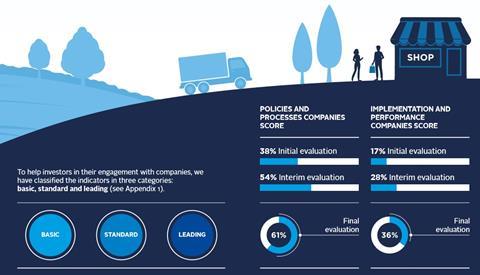Cross-cutting findings
Over the course of the second phase of the engagement, we found continuous and steady improvement across all sectors regarding labour practices in agricultural supply chains. These results are encouraging and demonstrate the impact of working collaboratively on tackling labour rights issues in supply chains.
Companies – in particular those in the general retailers and beverages sectors – made more progress on those indicators linked to the establishment of policies and processes than on those focused on implementation and performance (where only general retailers showed leadership). This trend could be explained by companies developing policies first against which performance could then be tracked over time. In taking the engagement forward, investors will need to focus on companies’ implementation of the policies and process they have established.
The area where there was the poorest performance, on average, was on traceability and risk assessment. However, for almost all the indicators linked to policy and process, at least one company achieved the maximum score, demonstrating that high performance is possible. Only for sourcing and supplier relations was there a significant gap between the maximum score achieved and best practice, and therefore the most room for improvement.
Investors also need to focus engagement efforts on governance and accountability and monitoring and corrective action. As companies move from policy to action, it is important for investors to understand how companies are assigning responsibility for different targets and actions, what the reporting lines are for information to flow at all levels, and the extent of support offered to those employees with responsibility for achieving desired results. In addition, action on the part of companies should be accompanied by clear and robust systems for remediation. Companies should be able to improve traceability and the visibility of any negative impacts they have caused or contributed to and be able to provide timely and adequate remedy to those affected.
Positive findings at the time of the final assessment showed that all companies have included respect for human rights in direct operations and supply chains, either as part of the code of conduct or as a separate commitment or policy. Almost all companies (97%) have a supplier code of conduct in place and 73% include expectations from the code in their contracts with tier 1 (i.e. direct) suppliers. We also found that more than 90% of companies’ supplier codes of conduct specifically mention the ILO’s eight fundamental and additional workers right conventions with regard to forced labour, child labour, freedom of association, collective bargaining, discrimination and working conditions, including pay.7


References
7 The ILO’s eight fundamental conventions are: Freedom of Association and Protection of the Right to Organise; Right to Organise and Collective Bargaining; Forced Labour; Abolition of Forced Labour; Minimum Age; Worst Forms of Child Labour; Equal Remuneration; and Discrimination. Additional workers’ rights under ILO conventions relate to occupational health, working conditions and wages.












